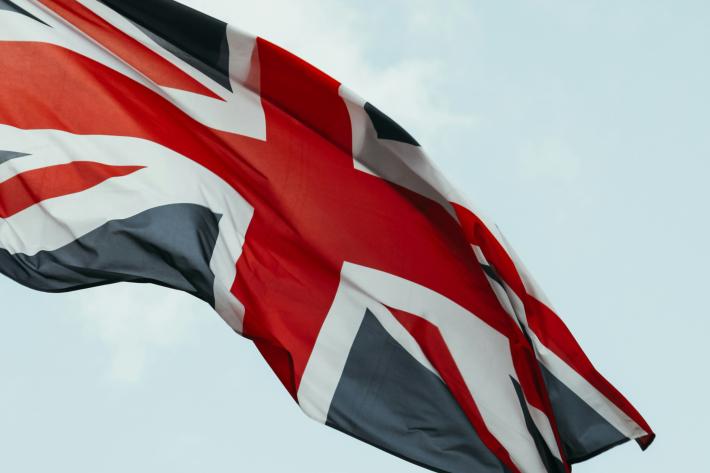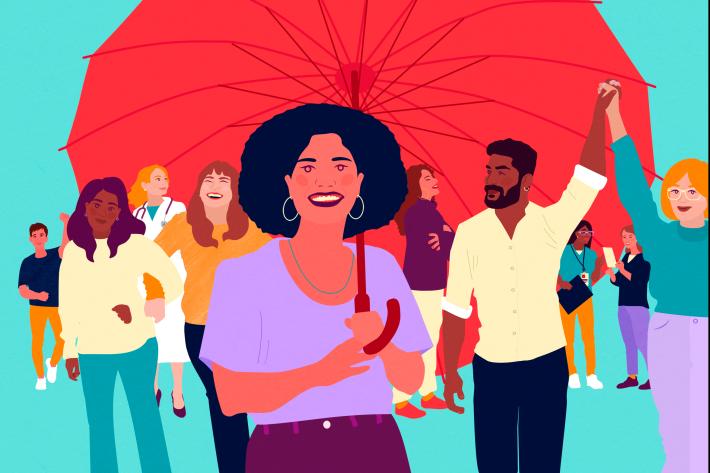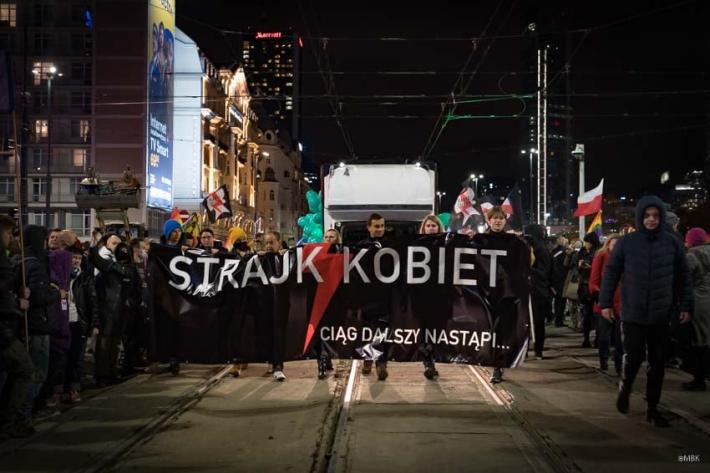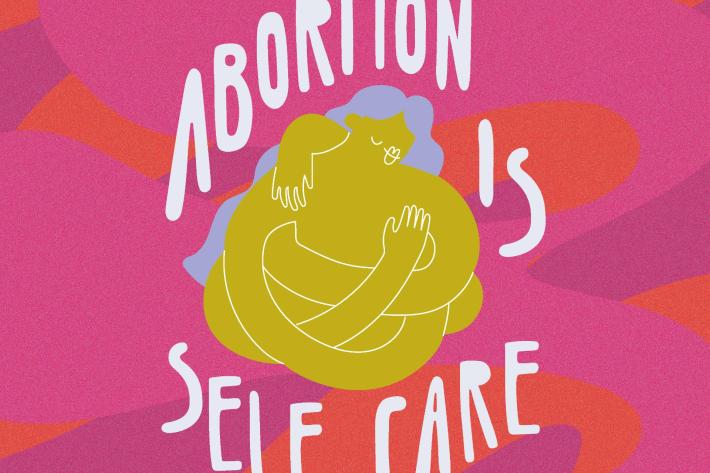
Spotlight
A selection of news from across the Federation

European Commission's new Women's Rights Roadmap includes SRHR—Now we need action
On 7 March, the EC released a new political declaration committing to uphold and advance women's rights. We welcome the inclusion of SRHR and other key topics. Now impactful actions are needed.
Filter our news by:


| 03 October 2024
Poland: Acquittal of women's rights defenders a relief, but the trial was unjust
Three Polish feminists on trial for pro-abortion protests have been found not-guilty. Although positive news, this is not a complete win for activists around the world. Marta Lempart, Klementyna Suchanow and Agnieszka Czerederecka-Fabin - three leading women’s rights defenders from the Polish Women's Strike were facing eight years in prison in Poland for exercising their right to peaceful protest. At today’s trial they were found not guilty. Though the not guilty verdict is a relief, we can’t ignore the fact that this trial never should have happened in the first place. These women’s rights defenders were unfairly targeted because of their work, with the prosecution attempting to use the courts as a tool of intimidation. Defending reproductive rights is not a crime. It is deeply troubling that they were subjected to a sham trial that not only robbed them of time, energy and money, but also affected their mental well-being. Cases like this are designed to silence activists. They are a dangerous attack on fundamental human rights and democratic values. In future, we urge the Polish government, and all governments, to focus on protecting rights, not prosecuting those who defend them. Marta Lempart said "I'm looking forward to going back to work. Thank you for all the solidarity from the international community."
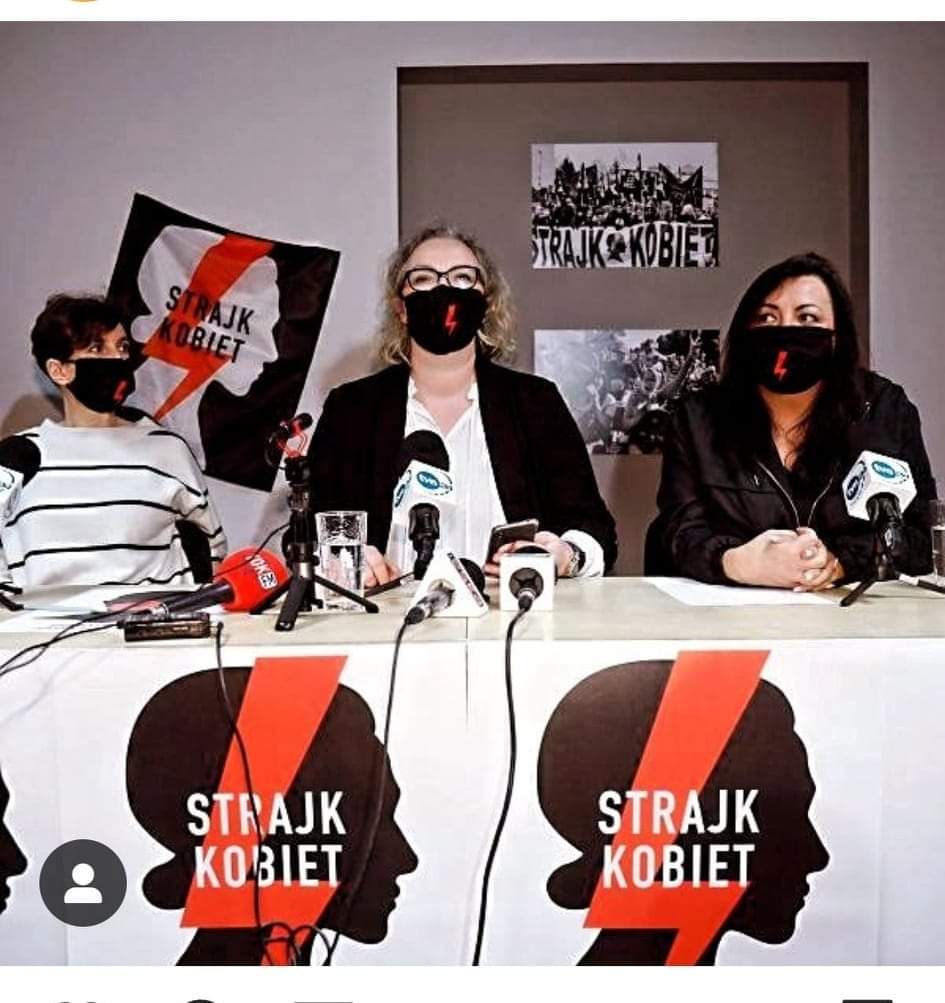
| 01 October 2024
Polish Women's Strike protests’ organizers on trial
Date: 3.10.2024 Time: 12.00 Courtroom: 224 Location: District Court in Warsaw, Solidarności 127 Press briefing after the verdict. The criminal case against Polish Women's Strike pro abortion protests’ (2020) leaders is finally coming to an end in the District Court in Warsaw, Poland. Marta Lempart, Agnieszka Czerederecka and Klementyna Suchanow are charged under Article 165 of the Penal Code (endangering the public by organizing protests) and Women's Strike leader Marta Lempart is additionally charged under Article 226 and Article 255 of the Penal Code. All three women face up to 8 years in prison. The announcement of the verdict will take place on October 3rd at noon in the District Court in Warsaw at 127 Solidarności Avenue (room: 224). This date is significant and symbolic for the entire movement that the Polish Women's Strike is. It was on October 3rd, 2016 that the Women's Strike organized the first mass protests in Poland in defense of abortion rights, which went down in history as Black Monday. At that time, women took to the streets of more than 160 cities and towns dressed in black in protest against the tightening of abortion law in Poland. On the 8th anniversary of the first Polish Women’s Strike protest (2016), activists will hear the verdict for their involvement in the 2020 100-days stress protests, brutally suppressed by the state police and secret services. It will be a verdict for their years of fighting in the streets, for the many days and nights spent protesting, in police cauldrons and in police detention. Judgment for their courage and determination, for their eyes burning with pain from the police gas, for their arms broken during the demonstrations, their spines physically damaged from the police batons. The judgment will therefore be symbolic not only for the anniversary of the Women's Strike, but above all for the fight for women's rights in contemporary Poland. The verdict will show which way we are heading - towards the shameful direction of maternity wards where women are dying, or towards the civilized part of Europe. Marta Lempart: Please be with us on that day. It is important that not only we, but also others who are still being dragged through the courts, know that they are not walking alone. Whatever happens this October 3rd or afterwards. See you there! Media contact: +48 577 099 077 Marta Lempart [email protected]

| 15 March 2023
Poland: Justyna gave her closing speech during trial
Justyna Wydrzyńska was charged with supporting Ania, a woman in an abusive relationship, to access abortion pills. A survivor herself of a similar situation to Ania, she took compassionate action to help the woman. Justyna’s efforts were reported to the police by Ania’s controlling husband. Ania was denied abortion care, but the stress caused her to miscarry. Justyna, a member of Abortion Without Borders and the Abortion Dream Team has been facing a legal battle for more than one year for facilitating an abortion that didn’t happen. Her closing speech in court follows: .... I stand here today because I gave someone my abortion pills. I sent them to another woman. It is an undeniable fact. I’m facing 3 years in prison. I didn’t do it out of my own initiative, because I do not distribute abortion pills. I knew that at that time, Ania was desperate. And I had a set of pills for my own use. The pills which I had for my own use, which I sent to Ania, are now the safest way to terminate a pregnancy in Poland. They are widely used in Europe and across the entire world by millions of people. They do not require anaesthesia, pose no complication risks, are safer than simple medical procedures. I know that from the reports of World Health Organization, which recommends unrestricted access to these pills, mifepristone and misoprostol. There are no contraindications against this. I sent my pills to Ania because I knew that she was in an abusive relationship - just like me a few years earlier. We were both controlled, emotionally blackmailed, lonely. We both have children and we wanted to protect them. I also experienced violence in a relationship. I was controlled, subjected to financial, physical and emotional abuse which were ubiquitous in “my” home. Us women, who experienced domestic violence, know what must be sacrificed to protect the safety of our children above all. I have three kids. Mothers in abusive relationships will do whatever they can for their children to sleep peacefully, for themselves to escape the constant, destructive tension.Us, who survive violence, keep our experiences a secret. We are ashamed of our lack of courage to fight for freedom, of allowing someone to control us. Often we stay - by choice and out of necessity. These obvious facts are tightly linked with the need to control one’s own reproductive autonomy. Living in abuse we often don’t realise that we have lost control over our bodies and the remainder of our lives. Because someone in our home decides for us, often against our will. I got pregnant by a man who hurt me, an abuser, and I terminated this pregnancy because I did not want it. My abortion made me realise I can control my own life, and I can regain that control. I felt that I can make my own decisions, and the fear I felt was not just for my body, but also for freedom which is a superior human right. I got divorced in 2009, after 11 years of marriage. I did it to save myself and my children. But the memories of abuse I went through are still present within me. This is not something you can just forget. And I do not wish this experience upon anyone. My own abortion was a breakthrough for me. I wouldn’t want to live in a world in which any woman is deprived of access to reliable information and simple human support. This has been motivating me in my activism, in my social work. For me this trial is symbolically a trial for anyone who ever provided support to a person in need. I feel I do not stand here alone. My friends have my back, but so do hundreds of women whom I haven’t yet had the chance to meet. Here, in this courtroom, we touch upon basic human rights, such as the right to self-determination. I have the support of numerous human rights organizations with their vast knowledge on these issues: Amnesty International, Human Rights Watch, Helsinki Foundation for Human Rights. Their opinion is clear: I am a human rights defender. And they are not alone in saying this. Catholics for Choice, Belgian Parliament, more than 80 members of the European parliament, high ranking rapporteurs on women’s rights have all approached the Polish parliament stating that I should not be prosecuted. I should never be oppressed for my work protecting women’s life and health. Similarly, the International Foundation of Gynecology and Obstetrics demands my exoneration and stresses that my work is not only safe, but also endorsed by the World Health Organization. Your honor knows about this, because numerous organisations filed amicus curiae letters in my case. These are not just expert opinions, but also the voices of hundreds of thousands of people who signed a petition to the prosecutor’s office. They all say the same. This trial should never have happened. I am thankful for this support. Yet I am here, Your Honor, sitting in the dock. And this last year has been very difficult for me, my family, for those close to me. I feel I am innocent. What I heard here in this room, the details of Anna’s situation, only convinced me that my actions were right. It made me realize that I should trust my intuition and take the risk of helping those who need it. I would never wish for any woman to be alone in these tough situations, without support, with her family acting against her. I believe that helping another person who asks for support as they fight for their freedom is our duty. It is what makes us human. And I will not abandon it, I will not be ashamed of it or believe that it is a crime. Your honor, we live in a country which doesn’t respect women. The polish anti-abortion law from 1993 was one of the most restrictive in Europe, because it forced people in unwanted pregnancies to have their abortions in secret. For them, activist organizations were the only respite from dangerous methods or peddlers. Initiatives like Abortion Without Borders are doing work which should have been the state’s job for years as part of the healthcare system. I’ve been working in this field for 16 years and witness how the state’s decisions and rulings worsen women’s situation. The anti-abortion law is not only cruel; it is fictitious. The law doesn’t stop people with unwanted pregnancies from terminating them. This is not my opinion - that’s what all abortion research shows, around the world. A woman who doesn’t want to be pregnant thinks pragmatically; how to access abortion, how much it will cost, can she afford it. And she will have that abortion, regardless of the law and regardless of how safe the method she uses will be. I thought this way, so did Anna, so do 100 000 women in Poland every year, so do Ukrainian refugees. And they are right. After October 22nd, 2020, when the pseudo-tribunal ruled in favor of further restricting abortion access, women whose pregnancies have fetal abnormalities started to go to Netherlands for help. There, it is possible to terminate until the 22nd week of pregnancy. Women with diagnosed fetal abnormalities ask: “do I have to go to a foreign country, feel like a fugitive, why can’t I do it in a hospital here, and then go home as soon as possible?”. Doctors in Dutch clinics simply say: “Polish women are the largest group of foreign patients in our clinics. They have special needs, they are often scarred by their experience with polish hospitals. We need to calm them down and reassure them that they will receive help”. The medical condition of women travelling to Dutch clinics worsens constantly since 2020. There are very many people who need an abortion here and now, who are in danger, not just from the cruel law, medical negligence, cowardice of doctors, but also from being in abusive relationships, under constant supervision. Being free from an unwanted pregnancy allows them to be free from abuse in general. That’s what it was for me, it was a factor in realising how I am being confined, how much I need freedom and the ability to decide for myself. I wanted the same for Anna. I wanted her to be free and control her life and body. I didn’t want her to risk her life when the solution was so simple and medically safe I do not want anyone to go alone through a dangerous process of an unsafe abortion when it is possible to do it safely, without stigma. I don’t want any of us to be forced to abandon her right to freedom and self-determination. I was driven by the will to help when no one else wanted to or could help. For me, helping Ania was an obvious, decent and honest thing to do. It’s good to be honest, even if it doesn’t always pay off. If I knew more about Ania’s situation, I wouldn’t just have sent her the pills. I would have stayed in touch to support her during the abortion, so she wouldn’t feel alone. So she would have someone who would listen, stay with her, hold her hands. We are here to decide on my guilt. I am not guilty and I will say it out loud: the State is guilty, of abandoning Ania, Iza from Pszczyna, Agnieszka from Częstochowa, and millions of women across the country. I ask the court for acquittal. Originally published by the Abortion Dream Team here.

| 23 March 2022
No to EU funds for the governments of Poland and Hungary
Civil society organisations write to the European Commission and the Council asking them to refrain from approving recovery funds to the governments of Poland and Hungary and instead provide direct support to local authorities, civil society and human rights defenders providing for refugees of the war. Neither Poland, nor Hungary, have made meaningful progress to restore the checks and balances necessary to uphold the rule of law and reinstate an independent judiciary. The war in Ukraine should not be used as a pretext to weaken the rule of law mechanism and let any Member State get away with serious rule of law violations. If anything, this war shows the very real dangers that come with a country dismantling the rule of law and democratic oversight. This is not the time to set aside concerns about the rule of law and respect of fundamental rights in EU Member States. Unblocking funds whereas the concerns in the countries remain as serious as ever, would be detrimental.
| 17 February 2022
Civil society asks Council of the EU to act on rule of law collapse in Poland
As the EU Council prepares to discuss the rule of law situation in Poland at its upcoming meeting on 22 February 2022, FIDH and other civil society organisations from Poland and across the EU draw EU ministers’ attention to recent, alarming developments, pointing to a severe and steady decline in the respect for EU values in the country. These include attempts to undermine judicial independence, refusal to comply with European court’s decisions, attacks on media freedom, and restrictions on civic space. Rule of law deficits are having negative impacts on human rights, particularly on the sexual and reproductive rights of women and on LGBTI people’s rights. In the letter, the signatory organisations urge EU governments to address these developments at next week’s meeting, to adopt recommendations that Polish authorities will have to implement within a clear time frame and/or to hold a vote to establish that the EU core values of respect for democracy, the rule of law and human rights have been seriously breached in Poland. Poland has been under scrutiny by the Council since December 2017, when the European Commission triggered the procedure laid down in Article 7.1 TEU on account of the "clear risk of a serious breach" of the values referred to in Article 2 TEU in the country. Despite the many actions undertaken by EU institutions since 2017, the Polish government has continued to systematically infringe upon EU standards and ignore warnings and decisions from the European Commission, the European Parliament, and the Court of Justice of the European Union. Immediate, effective, and concerted action by the Council is vital to halt attacks against Article 2 principles and reaffirm that rule of law and human rights violations have no place in the EU.

| 08 March 2022
Regression on Abortion Access Harms Women in Poland
26 January 2022 – One year after the ruling of Poland’s discredited Constitutional Tribunal banning access to abortion in almost all circumstances took effect, its devastating impact on the lives of women and all those in need of abortion care continues. The ruling has increased the extreme barriers women seeking access to abortion face and has had tragic consequences for many of them and their families. Since the ruling took effect on 27 January 2021, more than 1000 women have turned to the European Court of Human Rights in an effort to vindicate their rights, challenging Poland’s highly restrictive abortion law and seeking justice. These groundbreaking cases mark the first direct challenges to be filed before the European Court against Poland’s abortion law and the 2020 Constitutional Tribunal ruling. The applicants claim that the Polish abortion law causes them grave harm and violates their rights to privacy and freedom from torture and other ill-treatment. The Court is expected to begin ruling on some of these cases: K.B. v. Poland and 3 other applications; K.C. v. Poland and 3 other applications; and A.L.- B. v. Poland and 3 other applications. Nine leading international human rights organizations have filed third-party interventions to the European Court of Human Rights in these cases, including Amnesty International, the Center for Reproductive Rights, Human Rights Watch, the International Commission of Jurists (ICJ), the International Federation for Human Rights (FIDH), the International Planned Parenthood Federation European Network (IPPF EN), Women Enabled International, Women’s Link Worldwide, and the World Organisation Against Torture (OMCT). The interventions provide evidence and analysis drawing on international human rights law, comparative European law and guidelines from the World Health Organization. They outline the profound implications that highly restrictive abortion laws have on the lives and health of women and girls of reproductive age. Restrictive abortion laws such as Poland’s are contrary to international and European human rights standards and public health guidelines. They compromise women’s freedom, dignity, health, and lives. Our organizations’ interventions seek to highlight critical human rights aspects of such restrictive laws, and we are proud to support efforts to hold Poland accountable for these ongoing human rights violations, the organizations said. Background Poland has one of Europe’s most restrictive abortion laws. Together with Malta, it is one of only two European Union Member States that has not legalized abortion on request or broad social grounds. In Poland, abortion is only permitted in situations of risk to the life or health of a pregnant woman, or if a pregnancy results from rape. In practice, however, it is almost impossible for those eligible for a legal abortion to obtain one. Every year thousands of women leave Poland to access abortion care in other European countries, while others import medical abortion pills or seek extra-legal abortion in Poland. Polish women, particularly those in difficult socio-economic situations, have to depend on the crucial help from civil society organizations, with often limited resources. On 22 October 2020, Poland’s discredited Constitutional Tribunal ruled that abortion on grounds of “severe and irreversible fetal defect or incurable illness that threatens the fetus’ life” was unconstitutional. The ruling followed a case filed by members of the Polish Parliament and formally supported by the Prosecutor General. The ruling came into force on 27 January 2021. Both the European Court of Human Rights and the European Commission have found that the Constitutional Tribunal does not meet fair trial requirements due to its lack of independence from the legislative and the executive powers. The ruling eliminated one of the only remaining legal grounds for abortion under Poland’s highly restrictive law and its entry into force means that there is now effectively a near-total ban on abortion in Poland. Previously, over 90 percent of the approximately 1,000 legal abortions annually performed in Poland were on this ground. The ruling came as the COVID-19 pandemic restrictions made travel for abortion care prohibitively difficult and costly. It spurred the country’s largest public protests in decades, led by women human rights defenders. Activists and women’s rights organizations report that the ruling is having a significant chilling effect as medical professionals fear repercussions even in situations where abortion remains legal. Women human rights defenders and civil society organizations advocating for the ruling to be overturned and for reform of Poland’s abortion law have faced threats of violence and several protestors have been prosecuted. Read the third-party submissions here. For more information about the cases filed by 12 Polish women see: K.B. v. Poland and 3 other applications K.C. v. Poland and 3 other applications A.L.- B. v. Poland and 3 other applications For more information on the developments following the Tribunal’s ruling see e.g.: https://ec.europa.eu/commission/presscorner/detail/en/ip_21_7070 For more information, please contact: For the International Planned Parenthood Federation European Network, Irene Donadio: [email protected], +32 491 71 93 90, Twitter: @ippfen









